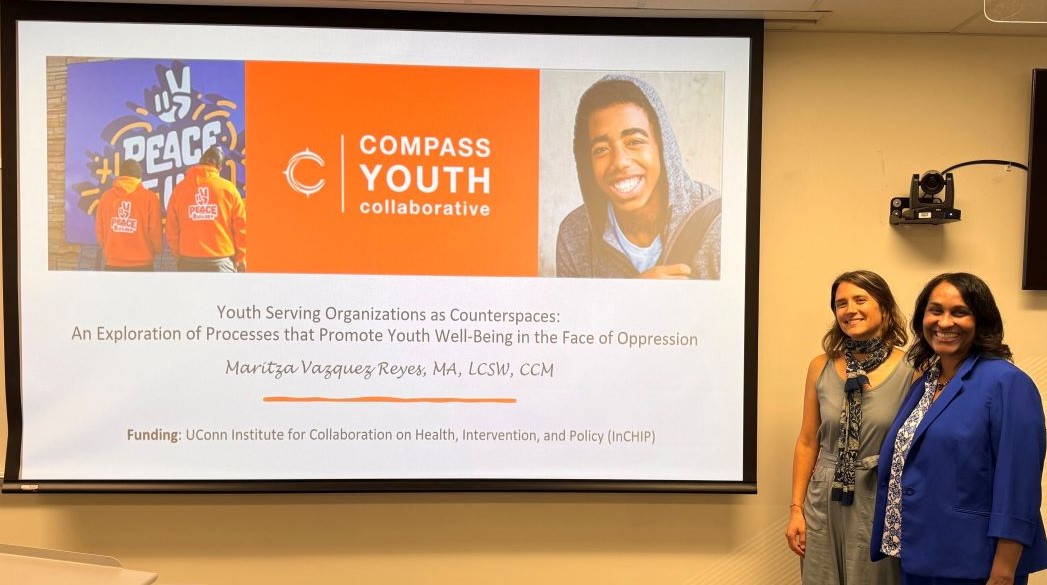Social Work for Impact: Our Five-Year Strategic Plan

Our Mission
Our mission is rooted in a passion for and commitment to social, racial, and economic justice and the improvement of human well-being, both locally and globally. Through our bachelor's, master's, and doctoral degree programs, we strive to prepare the next generation of micro and macro social work practitioners and scholars through excellence in teaching and learning both in the classroom and through innovative field and research experiences. Our faculty is committed to the generation and wide dissemination of cutting edge and impactful knowledge, informed by social justice and anti-oppressive lenses, through traditional and innovative research methodologies.

Message from Dean Curran
When I became dean of the UConn School of Social Work in 2023, the Strategic Plan was well underway. With input from students, alumni and advisory boards, the plan was built on a participatory and collaborative process. All members of the faculty and many members of our staff participated on subcommittees, which reviewed data on workforce trends, student enrollment, and schools of social work in the region to chart our future.
The result, Social Work for Impact: Our Five-Year Strategic Plan, has at its foundation a commitment to Diversity, Equity, Inclusion and Anti-Racism (DEI-AR) as a guiding principle for our efforts in all our focal areas, including Inclusive and Impactful Research and Scholarship; Student-Centered Teaching and Learning; Flexible and Forward-Looking Field Education; and Emerging Areas of Excellence in Social Work.
The School of Social Work stands proudly on more than 75 years of history preparing generations of social work scholars and practitioners. We are ranked among the top 9% of graduate social work programs nationally, at no. 28 as reported by U.S. News and World Report, and continue to be no. 1 in Connecticut.
Looking ahead to the future, we are committed to advancing high-value and impactful research and scholarship in our field with the support of a research and sponsored programs portfolio totaling $42.7 million. Our research and academic programs are made stronger by our long-standing partnerships with many state and community agencies. Our community of more than 8,800 accomplished alumni is strong and growing. The Strategic Plan ensures that our faculty scholars continue their excellence in generating and disseminating impactful knowledge that furthers our mission and the well-being of communities, locally and globally.
Read the details of our focal areas below.
Laura Curran, Ph.D.
Dean and Professor
Our Five Focal Areas
The University of Connecticut School of Social Work facilitates critical and crucial conversations around systemic oppression, race, power, and privilege. We examine our own positionality and place in the system while having a commitment to collaborate with others against oppression in all its forms.
Goal 1: Engage all faculty and staff in regular meaningful dialogue about diversity, equity, inclusion and anti-racism in our community and our work.
Goal 2: Foster modes of accountability and action around racial justice.
Progress to Date
- Held DEI-AR listening session in Spring 2024 to discuss DEI-AR needs and structure moving forward
- Established new ADEI (Anti-racism, Diversity, Equity and Inclusion) Committee
The Research and Scholarship subcommittee aims to chart obtainable goals for scholarly productivity and impact for the School of Social Work community, incorporating our diverse range of research and scholarship while emphasizing work that addresses interconnected, systematic oppression.
Goal 1: Increase the School's commitment to growing research and scholarship that includes theorizing, confronting, and addressing structural, interconnected oppressions.
Goal 2: Adopt structural reorganization at our School that supports collaboration and generation of knowledge around topical areas, including child welfare, international social work, substance abuse and mental health, violence and trauma, and health.
Goal 3: Intensify and expand the School’s investment in faculty research development.
Progress to Date
- Hosted speaker series with experts such as Tiffany Washington (UGA School of Social Work) discussing technology interventions to support family caregivers and Greta Bauer (University of Minnesota) on multidimensionality of social identities
- Offered expanded options for seed funding to support faculty research, including the Dean’s Incentive Award-Large Grant Program and the Dean’s Incentive Award-Research Teams Development Program
- Created an MSW Research Assistant Opportunity to be launched AY 2024-2025
The School of Social Work is an inclusive, equitable community that provides life transformative learning opportunities, ensuring access and success for all students. Our curriculum prepares BSW, MSW and PhD students to contribute to the social work profession at micro, mezzo, and macro levels, fostering a lifelong commitment to anti-oppression and social justice.
Goal 1: Prepare BSW, MSW, and PhD students for anti-oppressive practice at macro, mezzo, and micro levels, grounded in the values and ethics of the profession.
Goal 2: Ensure access to underrepresented groups and others by increasing flexibility of SSW course offerings, field offerings and guidelines, and degree options.
Goal 3: Support the learning of all students in our programs, including students from underrepresented groups, ensuring that students have the access, resources, and supports to take full advantage of their educational experience (including coursework, field, and extracurricular activities).
Progress to Date
- Provided high-impact presentations and trainings to faculty, adjuncts, field instructors and advisors. Examples include a workshop on anti-racist/social justice supervision; workshop on centering Black contributions to social work and mutual aid; presentation on fostering mental well-being in LGBTQIA+ youth and emerging adults; and a field diversity seminar, among others
- Developed and launched new part-time, fully Online MSW program to increase access and opportunity for students
The Practicum Education (formerly Field Education) subcommittee developed specific goals to enhance the professional training that bachelor’s and master’s social work students receive while completing their practicum internships, the signature pedagogy of social work education. The proposed goals have the dual aims of enhancing students’ life-transformative educational experience and aligning practicum placement opportunities with Connecticut’s pressing health and human services needs.
Goal 1: Revamp practicum education to implement Diversity, Equity, and Inclusion/Anti-Racism (DEI/AR) practice in all aspects of practicum education, such as placement selection, advising, instruction, and student training and support.
Goal 2: To promote equity and inclusion among our student body, develop strategies to increase flexibility in our practicum placement options while maintaining high-quality practicum assignments and supervision.
Progress to Date
- Updated the Employed Social Work (ESW) practicum placement policy to create greater ease for students to use relevant work experience/work sites as their designated practicum placement and extended the ESW policy to include BSW and Advanced Standing/advanced-year students
The School of Social Work will build on its varied strengths to address emerging workforce needs, extending our collaborative efforts throughout the university, community, and state, with a commitment to social justice and equity.
Goal 1: Enhance the profile of the School of Social Work as a center for excellence in social work education, research, and community-engaged practice.
Goal 2: Enhance continuing education to support workforce needs with a particular aim on addressing anti-racism, anti-oppressive practices, and diversity, equity, and inclusion (DEI/AR).
Goal 3: Collaborate with community partners to develop innovative opportunities to address workforce needs with a particular emphasis on addressing anti-racism, anti-oppressive practices, and diversity, equity, and inclusion (DEI/AR)
Progress to Date
- Communications: Disseminated faculty and Ph.D. student research findings across platforms, including the SSW website, UConn Today, a redesigned biannual digital newsletter and social media
- Continuing Education: The Center for CE and Professional Development held 10 trainings addressing anti-racism, anti-oppressive practices and DEI
- Strategic Initiatives: Launched Connecticut ¡Adelante!, an innovative MSW program to train bilingual social workers to support the mental health needs of the growing Spanish-speaking population in the state